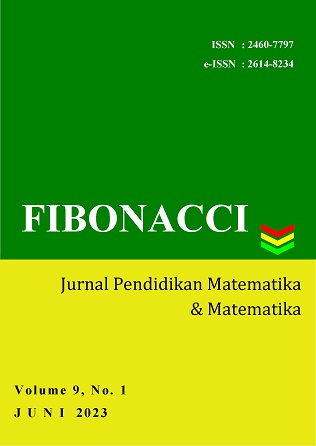PROSES BERPIKIR ALJABAR BERDASARKAN METAKOGNISI
Main Article Content
Abstract
Article Details
Authors who publish with this journal agree to the following terms:
- Authors retain copyright and grant the journal right of first publication with the work simultaneously licensed under a Creative Commons Attribution License that allows others to share the work with an acknowledgement of the work's authorship and initial publication in this journal.
- Authors are able to enter into separate, additional contractual arrangements for the non-exclusive distribution of the journal's published version of the work (e.g., post it to an institutional repository or publish it in a book), with an acknowledgement of its initial publication in this journal.
- Authors are permitted and encouraged to post their work online (e.g., in institutional repositories or on their website) prior to and during the submission process, as it can lead to productive exchanges, as well as earlier and greater citation of published work (See The Effect of Open Access).
References
Abdelrahman, R. M. 2020. Metacognitive awareness and academic motivation and their impact on academic achievement of Ajman University students. Heliyon, 6(9). https://doi.org/10.1016/j.heliyon.2020.e04192
Craig, K. 2020. Evaluating metacognitive self-reports: Systematic reviews of the value of self-report in metacognitive research. Metacognition and Learning, 15(2), 155–213. https://doi.org/10.1007/s11409-020-09222-y
Drigas, A. 2020. The 8 Pillars of Metacognition. International Journal of Emerging Technologies in Learning, 15(21), 162–178. https://doi.org/10.3991/ijet.v15i21.14907
Erika Fulton & Tina Miyake. (t.t.). Metacognition. Diambil 29 Mei 2022, dari https://www.assessmentpsychologyboard.org/edp/pdf/Metacognition.pdf
Hollins, T., & Schwartz, B. 2002. Applied Metacognition. https://doi.org/10.1017/CBO9780511489976
Kaput, J. J. 2017. What Is Algebra? What Is Algebraic Reasoning? 5018.
Kusuma, D., Rochmad, R., Matematika, I. I.-N., & 2021, undefined. 2021. Mitos dalam Matematika dan Aplikasinya dalam Pendidikan Matematika. Journal.Unnes.Ac.Id, 4, 129–133.
Marzali, A. 2017. Menulis Kajian Literatur. ETNOSIA : Jurnal Etnografi Indonesia, 1, 27. https://doi.org/10.31947/etnosia.v1i2.1613
Ntšohi, M. A. M. E. 2013. Investigating Teaching And Learning Of Grade 9 Algebra Through Excel Spreadsheets: A Mixed-Methods Case Study For Lesotho. December.
Paul Drijvers, Aad Goddijn, & Martin Kindt. 2011. Algebra Education: Exploring Topics and Themes. https://page-one.springer.com/pdf/preview/10.1007/978-94-6091-334-1_1
Porumb, I., & Manasia, L. 2015. A clusterial conceptualization of metacognition in students. 7.
Radford, L. 2010. Elementary forms of algebraic thinking in young students. Proceedings of the 34th Conference of the International Group for the Psychology of Mathematics Education, 4, 73–80.
Sibgatullin, I. R. 2022. A Systematic Review on Algebraic Thinking in Education. Eurasia Journal of Mathematics, Science and Technology Education, 18(1), 1–15. https://doi.org/10.29333/EJMSTE/11486
Somasundram, P. 2021. The Role of Cognitive Factors in Year Five Pupils’ Algebraic Thinking: A Structural Equation Modelling Analysis. Eurasia journal of mathematics, science and technology education, 17. https://doi.org/10.29333/EJMSTE/9612
Torres, M. D. 2021. Generalization process by second grade students. Mathematics, 9(10). https://doi.org/10.3390/math9101109
van Velzen, J. (2016). Metacognitive Learning. Springer International Publishing. https://doi.org/10.1007/978-3-319-24433-4

